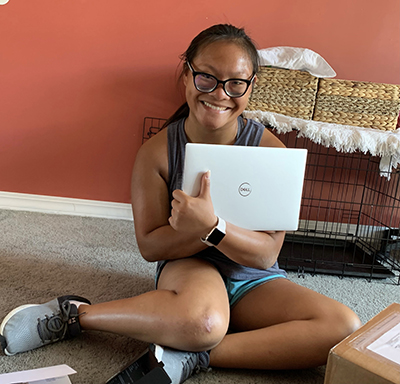Perspectives on Disability
Hi. I’m Jaida, and I have cerebral palsy. Cerebral palsy, or CP for short, happens when the oxygen supply to the brain is cut off during birth. This usually happens when the baby is born too early—that is what happened to me—or sometimes the umbilical cord is wrapped around the baby’s neck. In either case, the result is some damage to a part of the brain. In my case, the nerves that control my legs were the most affected. This type is called spastic because the muscles are tight and hard to control. My arms and fingers are hard to control as well, but not as much as my legs.

My vision is also affected. Even with glasses, I can’t see the board in class or even across the hall. Sometimes my eyes see things, but don’t get the message to my brain, and I’ve been known to trip on things that are right in front of me in plain view.
CP affects each person differently. Some people with CP can’t eat or swallow, and are fed through a feeding tube. Some use a wheelchair, and some could be sitting right next to you, and you’d never know they have CP because they are barely affected.
Because of my CP, people see me as a disability before seeing me as a person. This can be frustrating, because I am not the girl with cerebral palsy; I am a girl who happens to have cerebral palsy. When people asked me questions, it used to make me feel self-conscious. I would try to push the fact that I have a disability to the back of my mind and not think about it. I didn’t like people asking me questions because it reminded me that I have a disability. Now though, it doesn’t bother me as much, and I know people ask because they are concerned and curious. I know that my disability makes me unique and gives me perspectives that other people don’t have in the world.
Cerebral palsy is not the only disability out there. There are many others, and they each have different effects, which can impact people mentally, physically, or both. People with disabilities can often be looked upon more negatively than others. This is why the words people use to describe those who are disabled are important. Certain words are harmful and disrespectful. Using these types of words in a joking way tends to imply someone did something stupid. This annoys me, since it is implying that people with disabilities are stupid. I know some people think I am stupid because of my disability until they get to know me. They judge me on the way I look or move. I would ask all of you to get to know someone before you judge them, and please choose your words carefully.
Some people also assume that because of my disability, I can’t do certain things, and it’s infuriating because I can do most of the things they assume I can’t do. One time a doctor told me that I wouldn’t be able to learn how to walk. Now, I am on my school’s cross country team, and run at least 2.5 miles every day. Another time, someone told me I shouldn’t run on the playground because I’d fall. I did it anyway. One therapist said that all they wanted was for me to be able to sign my signature legibly enough so that I could sign documents. Now I write anything and everything legibly just fine.
Throughout my lifetime, I’ve had many people tell me that I can’t do something. However, people telling me I can’t do something is also the best thing they could ever do for me, because I am then determined to try and prove them wrong. Although a lot of people have told me I wouldn’t be able to do things, I have had more people try and help me and encourage me, which I am very thankful for.
Sometimes, when people try to help me, I get uncomfortable because I just want to do it on my own, but I do understand that they’re trying to be helpful. I appreciate how everyone, including teachers and students, have continued to support me in everything I do. That is what has gotten me to where I am today.
People always tell me that I take having a disability really well. I do most of the time, but sometimes I don’t, and I sit there and cry. I know I can’t change it, but sometimes I wish I was just a normal 16-year-old girl. However, having a disability has taught me so much. It taught me how to never give up when the thing I want seems impossible to attain, and how to appreciate others and not take things for granted. Remember the saying “don’t judge a book by its cover?” The same thing applies to people with disabilities. Don’t assume that just because someone is disabled, they can’t do something.
There are many ways in which we are different, but there are even more ways we are alike. We can elevate others by appreciating their differences and encouraging each other to support those differences. One final thing to remember and the most important to me is this quote by Carl Gustoff Jung, “I am not what happened to me. I am what I chose to become.”